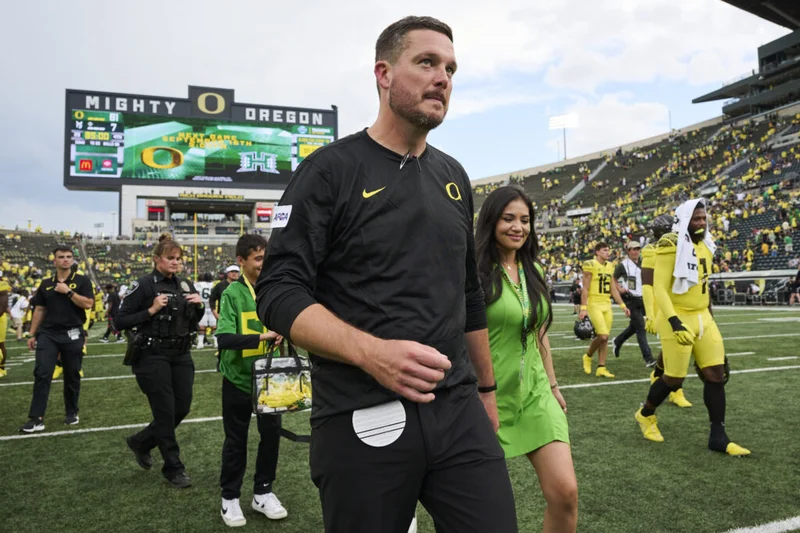Article Directory
I want you to imagine a complex system, a network under immense strain. Now, imagine a new node is introduced—a powerful, efficient, and fundamentally different piece of technology. What does the old network do? It doesn't welcome it. It tests it. It throws every conceivable stressor at the new node to see if it will break.
This is the lens through which we have to view the 2024 Oregon Ducks football season.
When you hear Oregon’s head coach, Dan Lanning, talk about his team’s schedule, it’s easy to hear it as a complaint. A 15,000-mile travel log. A gauntlet of seven different opponents who will have more time to prepare, including a brutal road trip to face a No. 3-ranked Penn State team that will be coming off a full bye week. You hear his pointed quote in a press conference: "It's almost like they didn't want us in the Big Ten, or something, right? We snuck our way in, didn't we?"
The traditional sports media frames this as classic coach-speak, a bit of whining to motivate the troops. But I see something else entirely. I see an engineer diagnosing the operating conditions of a hostile environment. Lanning isn’t complaining; he’s reading the code. He’s identifying the firewall. The Big Ten, the old, established mainframe of college football, is running a diagnostic on its newest, most disruptive plug-in. And the test is designed to induce system failure.
What makes this so fascinating is that the man at the center of this test is, himself, a systems architect of the highest order. The common, lazy narrative you hear from rival fans is that Dan Lanning "inherited a Ferrari" at Oregon. This is a fundamental misunderstanding of what actually happened. When I look at the timeline of him being hired on December 11, 2021, I honestly just find the entire scenario staggering. He didn't inherit a turnkey operation; he arrived at a tear-down.
The Brutal Schedule Isn't a Bug, It's a Feature
Engineering a New Operating System Under Fire
Let’s be clear about the situation. The previous coach had left abruptly. Top-tier recruits were decommitting. Established stars were heading for the NFL Draft. In total, only eight starters from the previous era were retained. All of this was happening while Lanning was still employed by the University of Georgia, tasked with coaching their defense to a national championship.
He wasn't just doing two jobs; he was building an entire organization from scratch in Eugene while simultaneously coaching one of the greatest defenses in college football history to a national title—it’s a level of cognitive and logistical multitasking that makes my head spin just thinking about it. He had to hire a staff, salvage a recruiting class, and dive headfirst into the transfer portal.
The transfer portal—think of it as a dynamic, chaotic, open-source marketplace for talent, a system that rewards speed and vision—became his primary tool. He didn't just plug holes. He acquired foundational pieces like quarterback Bo Nix and running back Bucky Irving, players who would become the core processors for his new machine. He blended this with elite high school recruiting, securing cornerstone talent like five-star lineman Josh Conerly.

This wasn't inheriting a Ferrari. This was like being handed the keys to a garage containing a few high-performance parts, a bunch of empty bays, and a blueprint, all while your old job demanded you win the 24 Hours of Le Mans one last time.
The result? A winning percentage of .867, a hair behind only Chip Kelly in the history of a storied program. Before Lanning, Oregon had three different head coaches in seven seasons. It was a program defined by instability. Lanning didn't just bring wins; he implemented a stable, scalable, and relentlessly efficient new operating system.
This is why the 2024 schedule is not a crisis, but a crucible. It’s the ultimate beta test. This moment in college sports feels like the shift from regional, siloed mainframe computing to the globally interconnected, brutally competitive world of the cloud. The old PAC-12 was a local network. The new coast-to-coast Big Ten is a different paradigm entirely. You can't run old software on this new hardware. You need a new architecture built for latency, stress, and hostile inputs.
This is what Lanning has been building. His consultation with NFL teams and sports-science experts on how to manage the 15,000 miles of travel—flying in a day earlier for a morning game at Northwestern, but later for a night game at Penn State—isn't just smart coaching. It’s algorithmic optimization. It's load-balancing for human beings.
Of course, there is a profound human component to this we must not overlook. We are talking about 18-to-22-year-old men, not silicon chips. The relentless optimization of their time, travel, and recovery pushes the boundaries of what we should ask of student-athletes. That is the ethical question at the heart of this new mega-conference reality, and it's one we'll all have to confront.
But the challenge is here. The system is what it is. And when asked if legacy powers like Ohio State or Michigan would ever face a schedule this demanding, Lanning’s response was a crisp, "No comment." He doesn't need to say more. He knows his role. He’s the disruptor. He’s the new variable the system is trying to account for.
So when Oregon travels to Happy Valley to face Penn State football, it’s more than just a game. It’s a proof-of-concept demonstration. It’s a new, agile, West Coast startup taking its prototype into the heart of the old guard's territory to see if it can withstand a peak-load stress test.
Can a program built on a modern architecture of talent acquisition, logistical precision, and cultural resilience withstand the brute-force attack of a schedule designed to break it? Can the new code run on the old network? We’re about to find out.
The Prototype Is Live ###
Dan Lanning isn't just coaching a football team. He is building the blueprint for the 21st-century national college football program. The schedule isn't a punishment; it's the final, brutal, and necessary validation of his entire model. He's not just trying to survive the future; he's engineering it.
Reference article source:



